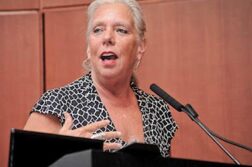Every year, we recount the lives and works of members of the GLBT community and allies that we have lost. Here are some of those who made made a difference who passed away over the last year.
Max (née Maxine) Feldman died suddenly on August 17, 2007, at age 62, in Albuquerque. In a 1998 interview with Bonnie Morris in Frontiers: A Journal of Women Studies, Feldman said that she “was thrown out of the Boston folk circuit for being queer.” A month after that incident, she moved to California, where she wrote the first song about lesbian identity, “Angry Atthis,” which she originally wanted to call “Sappho’s Song.” After reading that Atthis was one of Sappho’s lovers, she changed the name. It opens with the lines, “I hate not being able to hold my lover’s hand/ Except under some dimly-lit table/ Afraid of being who I am,” and ends triumphantly with the line “No longer afraid of being a lesbian!” Feldman eked out a living on the women’s music festival circuit, doing stand-up comedy, and once performing with Yoko Ono at Town Hall in Manhattan. Honored in 2004 by the Out Music Awards, Feldman was quoted as saying, “Stonewall proved I was not alone. It was time for our protests.” Plagued by health problems and struggling throughout life with gender identity issues, Feldman began to identify in the mid 90’s as a transgender butch lesbian, according to Helen Thornton, Feldman’s partner of four years.
Barbara Gittings died of cancer on February 18, 2007, at age 75, in Pennsylvania. See Marcia M. Gallo’s remembrance of Gittings in the May-June 2007 issue of this magazine.
Joanne Goodman Michaels died of cancer on October 9, 2007, at age fifty, in Harwich, Massachusetts. A career librarian with the Boston Public Library system, she received masters degrees in both library science and education. A founding member of HQ76.3/New England, a regional organization for GLBT librarians and library workers, she was active in the OutWrite conferences of the 1990’s and arranged a panel discussion in which she interviewed children about their reaction to gay- and lesbian-themed children’s literature. “She makes me proud to be queer” was the compliment that one of the OutWrite organizers bestowed on her. A fervent believer in the power of literature, she arranged library readings by many gay and lesbian writers, from Alison Bechdel to Michael Lowenthal, and did not shy away from controversy. She is survived by her spouse of many years, Robyn Michaels, to whom she was legally married in 2004 and whose last name she added to her own.
Bob Hattoy died of complications from AIDS on March 4, 2007, at age 56, in Sacramento. Hattoy became politicized during the Vietnam War era and began his political career as an environmentalist. At the 1992 Democratic National Convention, his speech, in which he assailed President George H. W. Bush’s AIDS policies, was the first ever to be given by an openly gay man with AIDS. President Clinton appointed him as associate director of personnel at the White House and later as White House liaison to the Interior Department, but he was often vigorously critical of the Clinton administration’s policies on gays in the military. Called “brash and often brutally witty” by The LA Times, he reportedly requested that his ashes “be preserved in a martini shaker.”
R. Scott Hitt died of cancer at age 49 on November 8, 2007, in West Hollywood. In 1996, he became the first openly gay person to head a presidential advisory board when he was named chairman of President Clinton’s Advisory Council on hiv/aids. According to activist David Mixner, one of Hitt’s main contributions was his insistence on including people of color in the fight against AIDS. Hitt became politicized several years after receiving his medical degree, and in 1989 he launched, with Mixner and others, Access Now for Gay and Lesbian Equality. In his later years he worked for same-sex marriage equality. He is survived by his partner of 27 years, Alex Koleszar.
Kay Longcope died of cancer on March 28, 2007, at age 69, in Austin, Texas. The first openly gay reporter at The Boston Globe, it was Longcope that Barney Frank sought out for an interview when he decided to come out publicly in 1987. A leader in educating heterosexual journalists about gay life and a force for self-respect in the GLBT community, she spent 22 years—despite suffering harassment for being out—at the Globe, where she specialized in coverage of AIDS and gay and lesbian issues. In the early 1990’s, she moved back to her home state of Texas, where she founded the state-wide weekly newspaper The Texas Triangle, which was notable for refusing advertisements from the sex industry and was honored by the National Gay and Lesbian Journalists Association for excellence in journalism. She is survived by her partner of seventeen years, Barbara Wohlgemuth.
Herbert Muschamp died of cancer on October 2, 2007, at age 59, in New York. He was the first full-time architecture critic for The New Republic, was The New York Times architecture critic from 1992 to 2004, and wrote for a variety of magazines. One of the most influential architecture critics of his generation, he championed many young and sometimes controversial architects and often used pop culture imagery to draw in the reader. Such was the case in his review of Frank Gehry’s Guggenheim Museum in Bilbao, in which he compared the museum to the reincarnation of Marilyn Monroe. A regular at Andy Warhol’s Factory during his college years, he was on the faculty of Parsons School of Design, where he had studied. He wrote several books and contributed essays to others, the most recent of which was 2006’s Mapplethorpe: The Complete Flowers.
Daniel Pinkham died of cancer on December 18, 2006, at age 83, in Natick, Massachusetts. A harpsichordist, organist, and conductor, he was best known as a composer of symphonies, choral and chamber works, and songs. He wrote “accessible and likeable” pieces, according to his obituary in The New York Times. The great-grandson of patent medicine tycoon Lydia E. Pinkham, his early influence was the Trapp Family Singers, whom he heard while a private school student. He went on to study with a variety of world-renowned musicians, including Nadia Boulanger. He was on the faculty at the New England Conservatory and was music director at King’s Chapel, both in Boston. He is survived by his partner, Andrew Paul Holman.
Gian Carlo Menotti died February 1, 2007, at age 95, in Monaco. Winner of two Pulitzers, he was “perhaps the most popular and prolific opera composer of his time,” according to the Times. He also wrote ballets, cantatas, and chamber music. His 1951 piece, Amahl and the Night Visitors, despite receiving some negative reviews for its “maudlin and unadventurous” style, has been performed over 600 times. Five of his operas were performed on Broadway in the 1940’s and 50’s, only one of which, Maria Golovin, was a flop. He founded Spoleto’s “Festival of Two Worlds” in 1958 and helped establish its American version in 1977, projects that took up most of his time and creative energy in his later years. He was professionally and romantically involved with composer Samuel Barber for many years until the latter’s death in 1981. He is survived by his son Francis.
Yolanda Retter died of cancer on August 18, 2007, at age 59, in LA. A self-described “gadfly on the body politic,” according to The LA Times, she was a community activist, particularly for lesbians of color. Her tremendously diverse interests and talents included airplane mechanics. She appeared on Oprah as a lesbian separatist in 1988. She earned masters degrees in both library science and social work, as well as a doctorate in American studies. She helped organize three major lesbian history repositories in southern California, and in recent years was the head librarian and archivist for the UCLA Chicano Studies Resource Center. She co-edited and contributed to a number of books, including Lesbian and Gay Rights in the United States (2003). She is survived by her partner of thirteen years, Leslie Golden Stampler.
Robert Tracy died of complications from HIV on June 7, 2007, at age 52, in New York. As an undergraduate, he studied with ballerina Melissa Hayden, who sent him to study at the New York City Ballet and the Alvin Ailey American Dance Theater, where he later helped manage the Ailey Archives. He also danced with the Chicago Lyric Opera Ballet and, according to an interview with the Australian newspaper The Age, was Rudolph Nureyev’s lover for two years. He was the longest-lasting of Nureyev’s live-in companions, and their relationship lasted for almost fourteen years, until shortly before Nureyev’s death in 1993. He was the author or editor of several books on ballet and wrote on dance and other topics in the arts for a variety of newspapers and magazines, including The New York Times and Vogue. His 1983 Balanchine’s Ballerinas, inspired by Hayden, was described as “this year’s great ballet book” by The Wall Street Journal.
Sources: Bay Windows (Boston); The Boston Globe; Dance Magazine (on-line); Frontiers: A Journal of Women Studies, no. 19.2, 1998; www.ibdb.com; HQ76.3 listserv; LA Times (on-line); www.mazerlesbianarchives.org; The New York Times (on-line); Provincetown Banner; www.theage.com.au.




